| Listing 1 - 10 of 10 |
Sort by
|
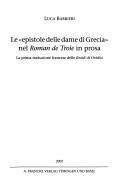
ISBN: 3772080960 Year: 2005 Volume: 123
Abstract | Keywords | Export | Availability | Bookmark
 Loading...
Loading...Choose an application
- Reference Manager
- EndNote
- RefWorks (Direct export to RefWorks)
Benoît, --- Ovid, --- Nasó, P. Ovidi, --- Naso, Publius Ovidius, --- Nazon, --- Ouidio, --- Ovide, --- Ovidi, --- Ovidi Nasó, P., --- Ovidiĭ, --- Ovidiĭ Nazon, Publiĭ, --- Ovidio, --- Ovidio Nasón, P., --- Ovidio Nasone, Publio, --- Ovidios, --- Ovidiu, --- Ovidius Naso, P., --- Ovidius Naso, Publius, --- Owidiusz, --- P. Ovidius Naso, --- Publiĭ Ovidiĭ Nazon, --- Publio Ovidio Nasone, --- Ūvīd, --- אוביד, --- Translations into French --- History and criticism. --- Ovid

ISBN: 0801442745 9780801442742 Year: 2005 Publisher: Ithaca Cornell university press
Abstract | Keywords | Export | Availability | Bookmark
 Loading...
Loading...Choose an application
- Reference Manager
- EndNote
- RefWorks (Direct export to RefWorks)
Comparative literature --- Ovid --- Literature, Modern --- Roman influences. --- Ovid, --- Criticism and interpretation --- History --- Translations --- History and criticism. --- In literature. --- Appreciation. --- Influence. --- Modern literature --- Arts, Modern --- Roman influences --- Nasó, P. Ovidi, --- Naso, Publius Ovidius, --- Nazon, --- Ouidio, --- Ovide, --- Ovidi, --- Ovidi Nasó, P., --- Ovidiĭ, --- Ovidiĭ Nazon, Publiĭ, --- Ovidio, --- Ovidio Nasón, P., --- Ovidio Nasone, Publio, --- Ovidios, --- Ovidiu, --- Ovidius Naso, P., --- Ovidius Naso, Publius, --- Owidiusz, --- P. Ovidius Naso, --- Publiĭ Ovidiĭ Nazon, --- Publio Ovidio Nasone, --- Ūvīd, --- אוביד,
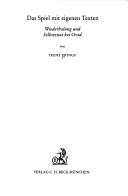
ISBN: 3406531520 9783406531521 Year: 2005 Volume: 124 Publisher: München Beck
Abstract | Keywords | Export | Availability | Bookmark
 Loading...
Loading...Choose an application
- Reference Manager
- EndNote
- RefWorks (Direct export to RefWorks)
Quotation --- Latin poetry --- Citation --- Poésie latine --- Criticism, Textual --- Critique textuelle --- Ovid, --- Criticism and interpretation --- Poésie latine --- Nasó, P. Ovidi, --- Naso, Publius Ovidius, --- Nazon, --- Ouidio, --- Ovide, --- Ovidi, --- Ovidi Nasó, P., --- Ovidiĭ, --- Ovidiĭ Nazon, Publiĭ, --- Ovidio, --- Ovidio Nasón, P., --- Ovidio Nasone, Publio, --- Ovidios, --- Ovidiu, --- Ovidius Naso, P., --- Ovidius Naso, Publius, --- Owidiusz, --- P. Ovidius Naso, --- Publiĭ Ovidiĭ Nazon, --- Publio Ovidio Nasone, --- Ūvīd, --- אוביד, --- Criticism and interpretation. --- Ovid --- Ovid, - 43 BC-17 AD or 18 AD - Criticism and interpretation --- Ovid, - 43 BC-17 AD or 18 AD
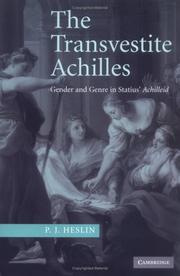
ISBN: 0521851459 9780521851459 9780511482236 9780521117753 051148223X 0511130430 9780511130434 0511128908 9780511128905 9780511300042 0511300042 1280416300 9781280416309 1107154189 0511182120 051119935X 0521117755 Year: 2005 Publisher: Cambridge : Cambridge University Press,
Abstract | Keywords | Export | Availability | Bookmark
 Loading...
Loading...Choose an application
- Reference Manager
- EndNote
- RefWorks (Direct export to RefWorks)
Statius' Achilleid is a playful, witty, and open-ended epic in the manner of Ovid. As we follow Achilles' metamorphosis from wild boy to demure girl to lover to hero, the poet brilliantly illustrates a series of contrasting codes of behaviour: male and female, epic and elegiac. This first full-length study of the poem addresses not only the narrative itself, but also sets the myth of Achilles on Scyros within a broad interpretive framework. The exploration ranges from the reception of the Achilleid in Baroque opera to the anthropological parallels that have been adduced to explain Achilles' transvestism. The study's expansive approach, which includes Ovid and Ovidian reception, psychoanalytic perspectives and theorizations of gender in antiquity, makes it essential reading not only for students of Statius, but for students of Latin literature, and of gender in antiquity.
Achille (Mythologie grecque) dans la littérature --- Achilles (Greek mythology) in literature --- Achilles (Griekse mythologie) in de literatuur --- Transvestites in literature --- Travestieten in literatuur --- Travestis en littérature --- Achilles (Greek mythology) in literature. --- Transvestites in literature. --- Statius, P. Papinius --- Ovid, --- Influence. --- Nasó, P. Ovidi, --- Naso, Publius Ovidius, --- Nazon, --- Ouidio, --- Ovide, --- Ovidi, --- Ovidi Nasó, P., --- Ovidiĭ, --- Ovidiĭ Nazon, Publiĭ, --- Ovidio, --- Ovidio Nasón, P., --- Ovidio Nasone, Publio, --- Ovidios, --- Ovidiu, --- Ovidius Naso, P., --- Ovidius Naso, Publius, --- Owidiusz, --- P. Ovidius Naso, --- Publiĭ Ovidiĭ Nazon, --- Publio Ovidio Nasone, --- Ūvīd, --- אוביד, --- Statius, P. Papinius (Publius Papinius) --- Ovid --- Influence --- Cross-dressers in literature. --- Achilles --- In literature. --- Achìe --- Achilas --- Achille --- Achilleus --- Achilli --- Ahil --- Ahile --- Ahilej --- Ahillejs --- Aĥilo --- Aichill --- Akhilles --- Akhilleus --- Akhilleusz --- Akiles --- Akili --- Akille --- Akilles --- Akkilles --- Aquiles --- Aquilles --- Axill --- Axilles --- Ἀχιλλεύς --- آخيل --- アキレウス --- Akireusu --- 아킬레우스 --- 阿喀琉斯 --- Ахіл --- Ахил --- Ахилл --- Akhill --- Ахіллес --- אכילס --- Akhiles --- Arts and Humanities --- History
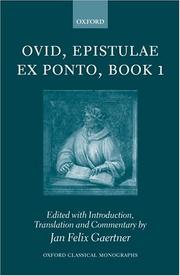
ISBN: 9780199277216 0199277214 Year: 2005 Volume: *35 Publisher: Oxford [etc.] Oxford University Press
Abstract | Keywords | Export | Availability | Bookmark
 Loading...
Loading...Choose an application
- Reference Manager
- EndNote
- RefWorks (Direct export to RefWorks)
Epistolary poetry, Latin. --- Exiles --- Poets, Latin --- Romans --- Correspondence. --- Homes and haunts --- Poètes latins --- Poésie épistolaire latine --- Correspondance --- Ovid, --- Epistolary poetry, Latin --- Ethnology --- Italic peoples --- Latini (Italic people) --- Latin poets --- Persons --- Aliens --- Deportees --- Refugees --- Latin epistolary poetry --- Latin poetry --- Correspondence --- Nasó, P. Ovidi, --- Naso, Publius Ovidius, --- Nazon, --- Ouidio, --- Ovide, --- Ovidi, --- Ovidi Nasó, P., --- Ovidiĭ, --- Ovidiĭ Nazon, Publiĭ, --- Ovidio, --- Ovidio Nasón, P., --- Ovidio Nasone, Publio, --- Ovidios, --- Ovidiu, --- Ovidius Naso, P., --- Ovidius Naso, Publius, --- Owidiusz, --- P. Ovidius Naso, --- Publiĭ Ovidiĭ Nazon, --- Publio Ovidio Nasone, --- Ūvīd, --- אוביד, --- Constanța (Romania) --- Tomes (Romania) --- Constantza (Romania) --- Kustenji (Romania) --- Kustendjie (Romania) --- Constanța, Romania (City) --- Tomis (Romania) --- Tomi (Romania) --- Κωνστάντζα (Romania) --- Kōnstantza (Romania) --- Κωνστάντια (Romania) --- Kōnstantia (Romania) --- Кюстенджа (Romania) --- Ki︠o︡stendzha (Romania) --- Констанца (Romania) --- Konstant︠s︡a (Romania) --- Köstence (Romania) --- Ovid

ISBN: 0715632892 1336212101 1472502450 1472539974 1472502469 9780715632895 9781472502452 9781472539977 9781472502469 9781472502469 Year: 2005 Volume: *1 Publisher: London Duckworth
Abstract | Keywords | Export | Availability | Bookmark
 Loading...
Loading...Choose an application
- Reference Manager
- EndNote
- RefWorks (Direct export to RefWorks)
"Ovid devoted about half of his poetic career to the production of several collections of amatory verse, all composed in elegiac couplets. Indeed, his irrepressible interest in love, sex and elegiac poetry is one of the defining features of his entire output. Here Rebecca Armstrong offers a thematic examination of some important aspects of the Amores, Ars Amatoria and Remedia Amoris. Starting from an investigation of the narrator's self-creation and presentation of other characters within his amatory verse, she assesses the importance of mythical and contemporary reference, as well as the influence of the erotic on Ovid's later works. By looking at the Ars and Remedia alongside the Amores, the continuities and contradictions in the poet's elegiac outlook are revealed, and a complex picture is formed of the Ovidian world of love. Ovid's erotic works present the reader with a glimpse inside the minds of both poets and lovers, mediated through eyes which are frequently inclined to comedy and even cynicism, but always sharp, perceptive and above all fascinated by human behaviour."--Bloomsbury Publishing Ovid devoted about half of his poetic career to the production of several collections of amatory verse, all composed in elegiac couplets. Indeed, his irrepressible interest in love, sex and elegiac poetry is one of the defining features of his entire output. Here Rebecca Armstrong offers a thematic examination of some important aspects of the Amores, Ars Amatoria and Remedia Amoris. Starting from an investigation of the narrator's self-creation and presentation of other characters within his amatory verse, she assesses the importance of mythical and contemporary reference, as well as the influence of the erotic on Ovid's later works. By looking at the Ars and Remedia alongside the Amores, the continuities and contradictions in the poet's elegiac outlook are revealed, and a complex picture is formed of the Ovidian world of love. Ovid's erotic works present the reader with a glimpse inside the minds of both poets and lovers, mediated through eyes which are frequently inclined to comedy and even cynicism, but always sharp, perceptive and above all fascinated by human behaviour
Love poetry, Latin --- Elegiac poetry, Latin --- History and criticism --- Ovid, --- Criticism and interpretation --- History and criticism. --- Criticism and interpretation. --- Love poetry, Latin - History and criticism --- Elegiac poetry, Latin - History and criticism --- Ovid, - 43 B.C.-17 or 18 A.D. - Criticism and interpretation --- Love poetry, Latin. --- Elegiac poetry, Latin. --- Latin elegiac poetry --- Latin poetry --- Latin love poetry --- Ovid --- Nasó, P. Ovidi, --- Naso, Publius Ovidius, --- Nazon, --- Ouidio, --- Ovide, --- Ovidi, --- Ovidi Nasó, P., --- Ovidiĭ, --- Ovidiĭ Nazon, Publiĭ, --- Ovidio, --- Ovidio Nasón, P., --- Ovidio Nasone, Publio, --- Ovidios, --- Ovidiu, --- Ovidius Naso, P., --- Owidiusz, --- P. Ovidius Naso, --- Publiĭ Ovidiĭ Nazon, --- Publio Ovidio Nasone, --- Ūvīd, --- אוביד, --- Ovidius Naso, Publius, --- Ovid, - 43 B.C.-17 or 18 A.D.
Multi
Abstract | Keywords | Export | Availability | Bookmark
 Loading...
Loading...Choose an application
- Reference Manager
- EndNote
- RefWorks (Direct export to RefWorks)
Studie naar heldinnenbrieven in het Nederlandse taalgebied, zowel in de moedertaal als in het Latijn. Daarnaast is binnen het corpus gezocht naar de variaties in het spel en naar de imitatioprocédés van de navolgers. Heldinnenbrieven betreffen geen privé-correspondenties, maar beogen juist een groot leespubliek. Ze bestaan uit versregels die niet door de afzenders zelf zijn geschreven, maar door dichters - dikwijls mannen - die de tekst voor hun personages - veelal vrouwen - hebben verzonnen. Ook wel 'literaire travestie' genoemd.
Dutch literature --- Drama --- anno 1800-1999 --- Heroid --- Epistolary poetry, Dutch --- Epistolary poetry, Latin (Medieval and modern) --- History and criticism --- Ovid --- Ovid, --- Parodies, imitations, etc --- 839.3-6 --- Nederlandse literatuur: brief --- 094 OVIDIUS NASO, PUBLIUS --- Oude en merkwaardige drukken. Kostbare en zeldzame boeken. Preciosa en rariora--OVIDIUS NASO, PUBLIUS --- Theses --- Heroid. --- History and criticism. --- 094 OVIDIUS NASO, PUBLIUS Oude en merkwaardige drukken. Kostbare en zeldzame boeken. Preciosa en rariora--OVIDIUS NASO, PUBLIUS --- 839.3-6 Nederlandse literatuur: brief --- Imaginary letters --- Latin epistolary poetry, Medieval and modern --- Latin poetry, Medieval and modern --- Dutch epistolary poetry --- Dutch poetry --- Nasó, P. Ovidi, --- Naso, Publius Ovidius, --- Nazon, --- Ouidio, --- Ovide, --- Ovidi, --- Ovidi Nasó, P., --- Ovidiĭ, --- Ovidiĭ Nazon, Publiĭ, --- Ovidio, --- Ovidio Nasón, P., --- Ovidio Nasone, Publio, --- Ovidios, --- Ovidiu, --- Ovidius Naso, P., --- Ovidius Naso, Publius, --- Owidiusz, --- P. Ovidius Naso, --- Publiĭ Ovidiĭ Nazon, --- Publio Ovidio Nasone, --- Ūvīd, --- אוביד, --- Parodies, imitations, etc. --- Epistolary poetry, Dutch - History and criticism --- Epistolary poetry, Latin (Medieval and modern) - History and criticism --- Ovid - 43 B.C.-17 or 18 A.D - Parodies, imitations, etc --- Ovid, - 43 B.C.-17 or 18 A.D. - Heroides --- Ovid - 43 B.C.-17 or 18 A.D

ISBN: 0521846722 9780521846721 9780511482175 9780521117814 0511482175 9780511128004 0511128002 0511127472 9780511127472 0511300255 9780511300257 1280422343 9781280422348 1107152518 9781107152519 0511182279 9780511182273 0511199694 9780511199691 052111781X Year: 2005 Publisher: Cambridge : Cambridge University Press,
Abstract | Keywords | Export | Availability | Bookmark
 Loading...
Loading...Choose an application
- Reference Manager
- EndNote
- RefWorks (Direct export to RefWorks)
Ovid's Heroides, a catalogue of letters by women who have been deserted, has too frequently been examined as merely a lament. In a new departure, this book portrays the women of the Heroides as a community of authors. Combining close readings of the texts and their mythological backgrounds with critical methods, the book argues that the points of similarity between the different letters of the Heroides, so often derided by modern critics, represent a brilliant exploitation of intratextuality, in which the Ovidian heroine self-consciously fashions herself as an alluding author influenced by what she has read within the Heroides. Far from being naive and impotent victims, therefore, the heroines are remarkably astute, if not always successful, at adapting textual strategies that they perceive as useful for attaining their own ends. With this new approach Professor Fulkerson shows that the Heroides articulate a fictional poetic, mirroring contemporary practices of poetic composition.
Epistolary poetry, Latin --- Women in literature --- History and criticism --- Ovid, --- Authorship in literature. --- Books and reading in literature. --- Heroines in literature. --- Intertextuality. --- Love-letters in literature. --- Mythology, Classical, in literature. --- Women authors in literature. --- Women in literature. --- History and criticism. --- Technique. --- Authorship in literature --- Books and reading in literature --- Heroines in literature --- Intertextuality --- Love-letters in literature --- Mythology, Classical, in literature --- Women authors in literature --- Woman (Christian theology) in literature --- Women in drama --- Women in poetry --- Criticism --- Semiotics --- Influence (Literary, artistic, etc.) --- Heroines --- Nasó, P. Ovidi, --- Naso, Publius Ovidius, --- Nazon, --- Ouidio, --- Ovide, --- Ovidi, --- Ovidi Nasó, P., --- Ovidiĭ, --- Ovidiĭ Nazon, Publiĭ, --- Ovidio, --- Ovidio Nasón, P., --- Ovidio Nasone, Publio, --- Ovidios, --- Ovidiu, --- Ovidius Naso, P., --- Ovidius Naso, Publius, --- Owidiusz, --- P. Ovidius Naso, --- Publiĭ Ovidiĭ Nazon, --- Publio Ovidio Nasone, --- Ūvīd, --- אוביד, --- Ovid --- Arts and Humanities --- History --- Epistolary poetry, Latin - History and criticism --- Ovid, - 43 B.C.-17 or 18 A.D. - Heroides --- Ovide (0043 av. J.-C.-0017). Héroïdes --- Poésie élégiaque latine --- Ovide (0043 av. J.-C.-0017) --- Mythologie classique --- Femmes --- Héroïnes (littérature) --- Personnages --- Dans la littérature
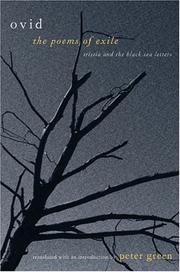
ISBN: 0520931378 9780520931374 0520242602 9780520242609 0140444076 9780140444070 1322401543 Year: 2005 Publisher: Berkeley, CA : University of California Press,
Abstract | Keywords | Export | Availability | Bookmark
 Loading...
Loading...Choose an application
- Reference Manager
- EndNote
- RefWorks (Direct export to RefWorks)
In the year A.D. 8, Emperor Augustus sentenced the elegant, brilliant, and sophisticated Roman poet Ovid to exile-permanently, as it turned out-at Tomis, modern Constantza, on the Romanian coast of the Black Sea. The real reason for the emperor's action has never come to light, and all of Ovid's subsequent efforts to secure either a reprieve or, at the very least, a transfer to a less dangerous place of exile failed. Two millennia later, the agonized, witty, vivid, nostalgic, and often slyly malicious poems he wrote at Tomis remain as fresh as the day they were written, a testament for exiles everywhere, in all ages. The two books of the Poems of Exile, the Lamentations (Tristia) and the Black Sea Letters (Epistulae ex Ponto), chronicle Ovid's impressions of Tomis-its appalling winters, bleak terrain, and sporadic raids by barbarous nomads-as well as his aching memories and ongoing appeals to his friends and his patient wife to intercede on his behalf. While pretending to have lost his old literary skills and even to be forgetting his Latin, in the Poems of Exile Ovid in fact displays all his virtuoso poetic talent, now concentrated on one objective: ending the exile. But his rhetorical message falls on obdurately deaf ears, and his appeals slowly lose hope. A superb literary artist to the end, Ovid offers an authentic, unforgettable panorama of the death-in-life he endured at Tomis.
Poets, Latin --- Epistolary poetry, Latin --- Complaint poetry, Latin --- Exiles --- Romans --- Ethnology --- Italic peoples --- Latini (Italic people) --- Latin complaint poetry --- Latin poetry --- Latin poets --- Ovid, --- Nasó, P. Ovidi, --- Naso, Publius Ovidius, --- Nazon, --- Ouidio, --- Ovide, --- Ovidi, --- Ovidi Nasó, P., --- Ovidiĭ, --- Ovidiĭ Nazon, Publiĭ, --- Ovidio, --- Ovidio Nasón, P., --- Ovidio Nasone, Publio, --- Ovidios, --- Ovidiu, --- Ovidius Naso, P., --- Owidiusz, --- P. Ovidius Naso, --- Publiĭ Ovidiĭ Nazon, --- Publio Ovidio Nasone, --- Ūvīd, --- אוביד, --- Constanța (Romania) --- Tomes (Romania) --- Constantza (Romania) --- Kustenji (Romania) --- Kustendjie (Romania) --- Constanța, Romania (City) --- Tomis (Romania) --- Tomi (Romania) --- Κωνστάντζα (Romania) --- Kōnstantza (Romania) --- Κωνστάντια (Romania) --- Kōnstantia (Romania) --- Кюстенджа (Romania) --- Ki︠o︡stendzha (Romania) --- Констанца (Romania) --- Konstant︠s︡a (Romania) --- Köstence (Romania) --- Ovid --- Ovidius Naso, Publius, --- ancient mediterranean. --- ancient rome. --- ancient world. --- augustus. --- banned books. --- barbarians. --- black sea letters. --- black sea. --- censorship. --- classical literature. --- classicism. --- classics. --- constantza. --- empire. --- epics. --- epistulae ex ponto. --- exile. --- lamentations. --- latin literature. --- latin. --- letters. --- literary criticism. --- literature. --- nomads. --- ovid. --- poems of exile. --- poet. --- poetry. --- political prisoner. --- raids. --- rhetoric. --- roman empire. --- roman literature. --- roman poetry. --- romania. --- rome. --- theocratic age. --- tomis. --- tristia. --- violence. --- war.
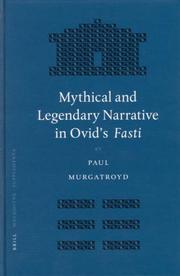
ISBN: 9004143203 9789047407225 9047407229 1433707527 9781433707520 9789004143203 1280867817 9781280867811 9786610867813 661086781X Year: 2005 Volume: 263 Publisher: Leiden ; Boston : Brill,
Abstract | Keywords | Export | Availability | Bookmark
 Loading...
Loading...Choose an application
- Reference Manager
- EndNote
- RefWorks (Direct export to RefWorks)
This book analyses the mythical and legendary narratives in Ovid's Fasti as narrative and concentrates on the neglected literary aspects of these stories. It combines traditional tools of literary criticism with more modern techniques (taken especially from narratology and intertextuality). From a narratological viewpoint it covers important features such as aperture, closure, characterization, internal narrators, description, space, time and cinematic technique. On the intertextual level it examines the narratives' complex relationship with Virgil, Livy and Ovid's own earlier works. Recent criticism on the Fasti has addressed various elements (religious, historical, political, astronomical et cetera), but detailed narrative study has been wanting. This book fills that gap, to provide a more informed and balanced appreciation of this multifaceted poem aimed at classicists and literary critics in general (for whom all the Latin is translated).
Didactic poetry, Latin --- Fasts and feasts in literature. --- Legends in literature. --- Mythology, Roman, in literature. --- Narration (Rhetoric) --- Rhetoric, Ancient. --- History and criticism. --- History --- Ovid, --- Knowledge --- Mythology. --- Rome --- In literature. --- Ancient rhetoric --- Antieke retoriek --- Fasts and feasts in literature --- Feesten [Godsdienstige ] in de literatuur --- Fêtes religieuses dans la littérature --- Godsdienstige feesten in de literatuur --- Legenden in de literatuur --- Legends in literature --- Légendes dans la littérature --- Mythologie [Romeinse ] in literatuur --- Mythologie romaine dans la littérature --- Mythology [Roman ] in literature --- Retoriek [Antieke ] --- Retoriek van de Oudheid --- Rhetoric [Ancient ] --- Rhétorique ancienne --- Rhétorique de l'Antiquité --- Rome -- Dans la littérature --- Rome -- In de literatuur --- Rome -- In literature --- Rome dans la littérature --- Rome in de literatuur --- Rome in literature --- Poésie didactique latine --- Mythologie romaine dans la littérature --- Fêtes religieuses dans la littérature --- Légendes dans la littérature --- Rhétorique ancienne --- Histoire et critique --- Rome dans la littérature --- Mythology, Roman, in literature --- Rhetoric, Ancient --- Classical languages --- Greek language --- Greek rhetoric --- Latin language --- Latin rhetoric --- History and criticism --- Rhetoric --- Nasó, P. Ovidi, --- Naso, Publius Ovidius, --- Nazon, --- Ouidio, --- Ovide, --- Ovidi, --- Ovidi Nasó, P., --- Ovidiĭ, --- Ovidiĭ Nazon, Publiĭ, --- Ovidio, --- Ovidio Nasón, P., --- Ovidio Nasone, Publio, --- Ovidios, --- Ovidiu, --- Ovidius Naso, P., --- Ovidius Naso, Publius, --- Owidiusz, --- P. Ovidius Naso, --- Publiĭ Ovidiĭ Nazon, --- Publio Ovidio Nasone, --- Ūvīd, --- אוביד, --- Ovid --- Mythology --- Didactic poetry [Latin ] --- To 1500 --- Didactic poetry, Latin. --- Literature. --- Narrative (Rhetoric) --- Narrative writing --- Discourse analysis, Narrative --- Narratees (Rhetoric) --- Myths --- Legends --- Religion --- Religions --- Folklore --- Gods --- Myth --- Belles-lettres --- Western literature (Western countries) --- World literature --- Philology --- Authors --- Authorship --- Latin didactic poetry --- Latin poetry --- Fasti (Ovid) --- Fastes (Ovid) --- Tempora cum causis Latium digesta per annum (Ovid) --- Rome (Empire) --- Rim --- Roman Empire --- Roman Republic --- Romi (Empire) --- Byzantine Empire --- Italy --- Didactic poetry, Latin - History and criticism. --- Narration (Rhetoric) - History - To 1500. --- Ovid, - 43 B.C.-17 or 18 A.D. - Fasti. --- Ovid, - 43 B.C.-17 or 18 A.D. - Knowledge - Mythology. --- Rome - In literature. --- Ovid, - 43 B.C.-17 or 18 A.D.
| Listing 1 - 10 of 10 |
Sort by
|

 Search
Search Feedback
Feedback About
About Help
Help News
News